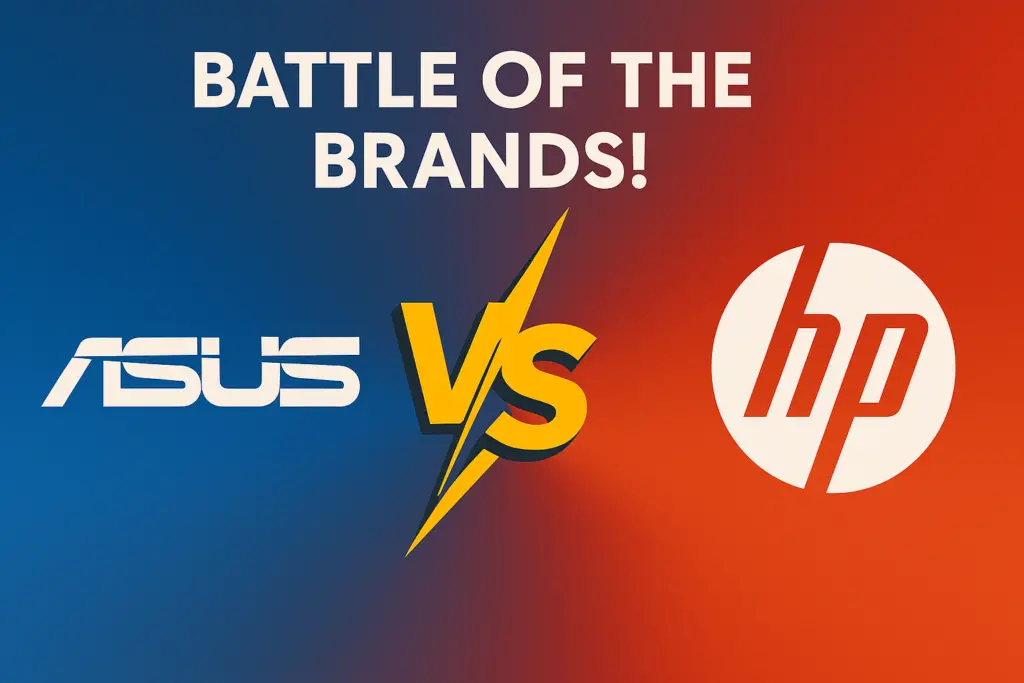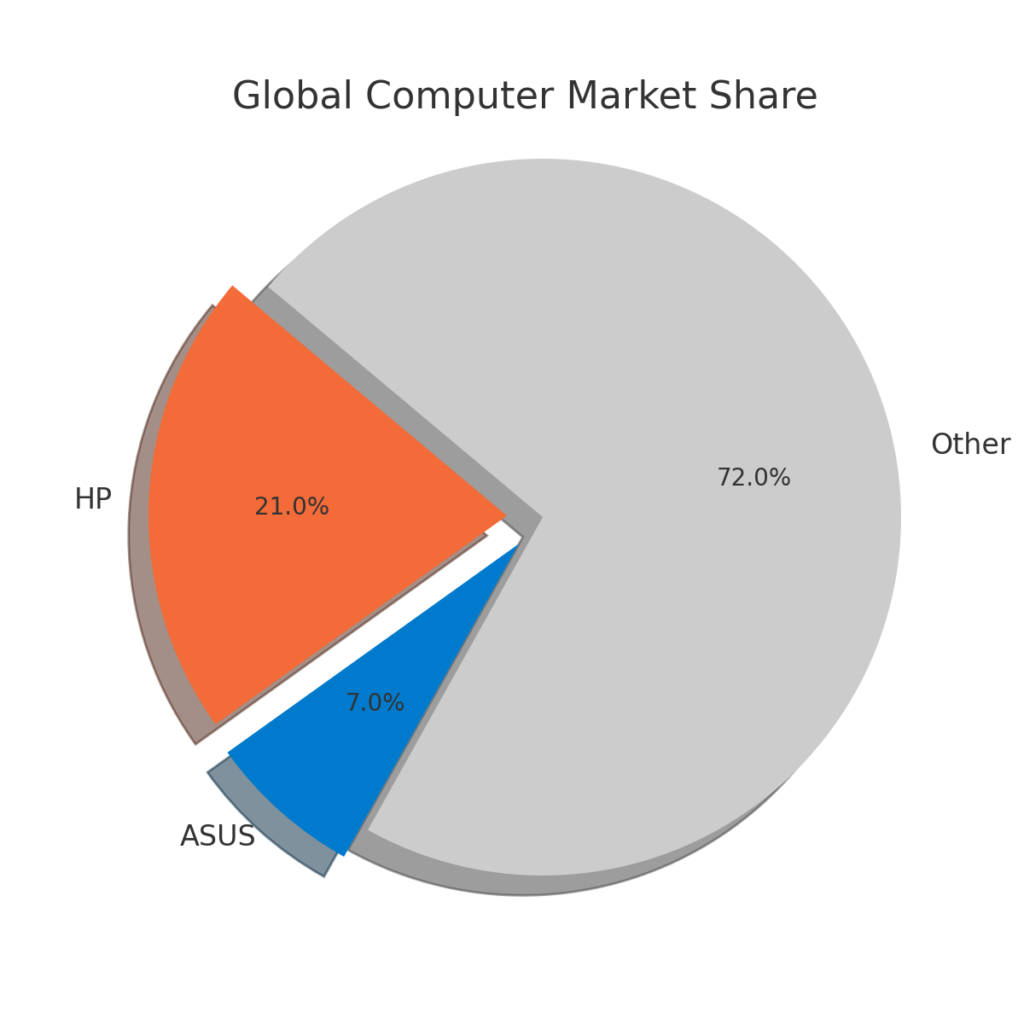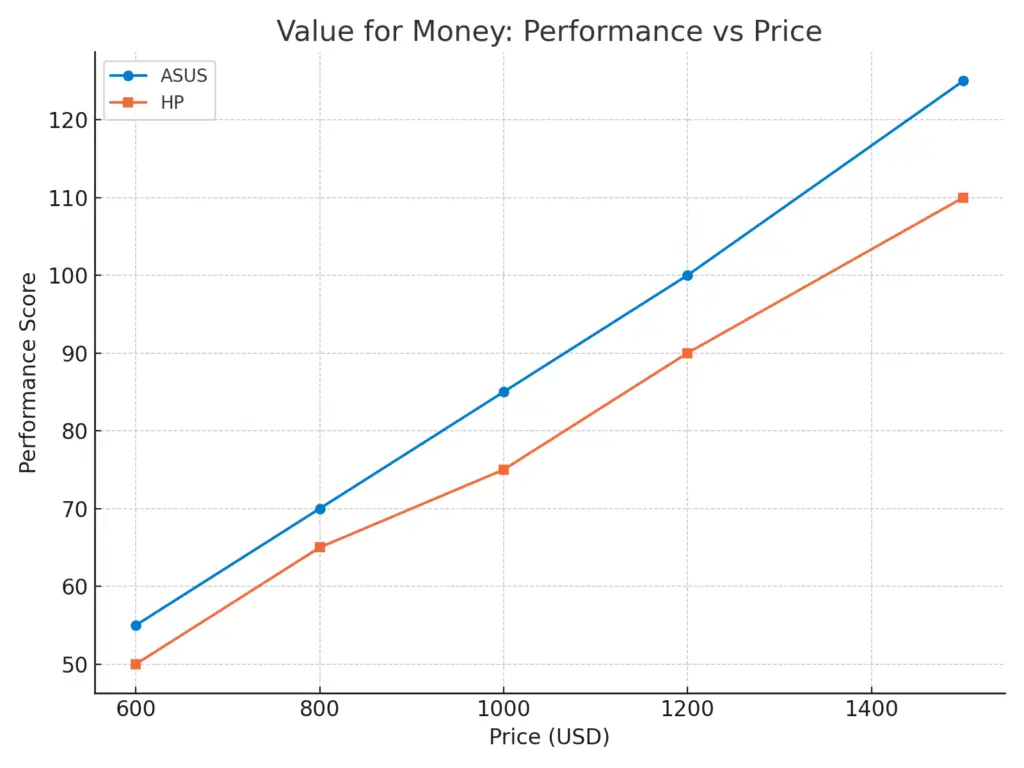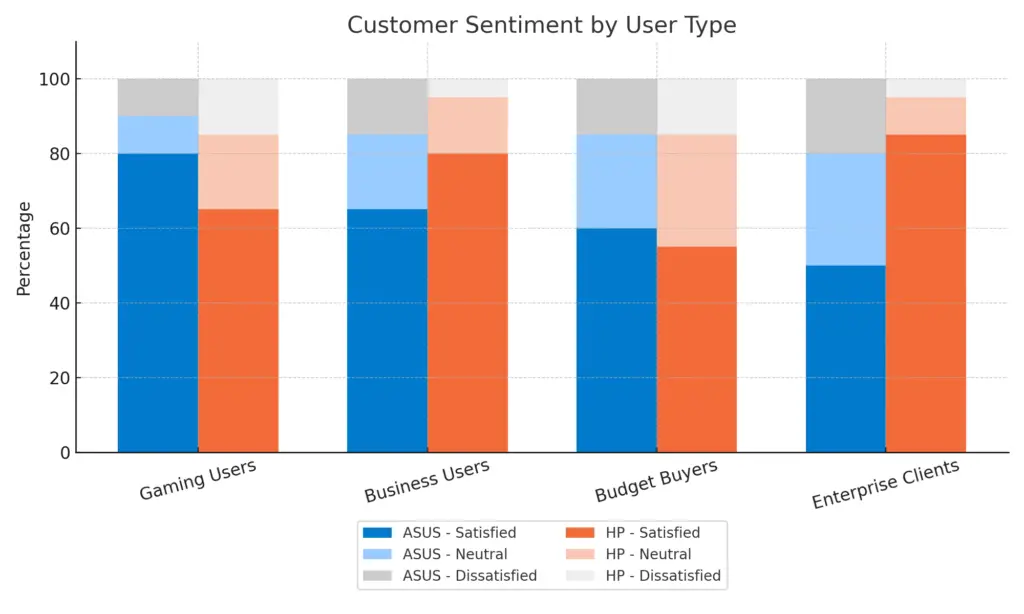ASUS VS HP
Battle of the Brands!

ASUS and HP are both well-known computer hardware companies recognized for their wide range of tech products. In today’s edition of InformedTechie’s Battle of the Brands, we’ll put the two head-to-head to find out which one better meets your needs!
Since not every consumer has the same priorities, we’ll grade each brand across four key categories. You can decide which company offers the best balance of pros and cons for your specific situation. At the end, we’ll crown an overall winner—but feel free to jump to the sections that matter most to you.
Company Overviews
ASUSTeK Computer Inc., better known as “ASUS,” is headquartered in Taipei, Taiwan. The company quickly rose to prominence thanks in part to its innovation in motherboards.
Today, ASUS holds about 7% of the global computer market share and is widely recognized for its ROG (Republic of Gamers) line, which is especially popular among PC gaming enthusiasts and professionals. ASUS offers a vast range of products—from mobile devices and laptops to monitors, peripherals, and more.
HP Inc., based in Palo Alto, California, is one of the oldest and largest PC manufacturers in the world. It employs over 50,000 people and holds about 21% of global market share. HP is best known for its printing and business solutions, as well as its personal computers and laptops. While it’s started to explore the gaming market, HP’s primary focus remains on professional and personal users.

Support
Since both ASUS and HP are massive multinational enterprises, don’t expect the boutique service you’d get from a local shop. Support is a bit of a weak point for both. Here’s how they stack up:
- Support Channels: Both brands offer phone, email, and live chat support.
- Availability: HP provides 24/7 support for many products. ASUS also offers 24/7 support, though it’s often more limited.
- Wait Times: HP’s live chat generally has shorter wait times. ASUS users often report being redirected to phone support or waiting for email replies.
- Troubleshooting Resources:
- ASUS offers community forums, FAQs, and manuals.
- HP offers all of the above, plus more video tutorials.
- Remote Tech Support:
- HP commonly provides remote tech assistance.
- ASUS is more likely to ask users to ship devices for repair.
- Repairs and Warranty:
- ASUS may require you to pay for shipping when sending a device in for repair.
- ASUS repair turnaround: 2–4 weeks.
- HP repair turnaround: 1–2 weeks.
- Warranty flexibility seems better with HP. One YouTuber noted ASUS refused a repair just six days after warranty expiration, though experiences vary.
Verdict: HP WINS
HP’s support is more consistent and user-friendly—especially for those needing fast, straightforward help. ASUS can be hit-or-miss, though technical users may still find it adequate for major issues.
Reliability, Quality, and Design
This section comes with a caveat: both brands have such broad product lines that it’s tough to generalize. A $400 HP laptop and a $2,000 HP laptop will likely have very different quality and reliability.
| ASUS | HP | |
|---|---|---|
| Materials Used | Metal chassis in mid/high-end models | Varies widely by product line |
| Durability | Generally solid, especially ROG models | Flimsy builds are more common |
Design
- ASUS leans toward sleek, edgy designs, often gamer-focused with RGB lighting.
- HP tends to favor more traditional, business-friendly designs that don’t draw attention in professional settings.
Component Quality
- ASUS, with its background in motherboard manufacturing, often makes many components in-house. HP outsources more frequently. ASUS machines feel less mass-produced and are easier to upgrade.
- ASUS cooling systems are world-class—even on gaming machines. HP’s gaming laptops can suffer from overheating.
- ASUS usually offers more generous I/O and port options.
Displays
- ASUS: High refresh rates and accurate color in many lines.
- HP: Also strong, especially in the Envy and Spectre series.
Keyboard & Trackpad
- ASUS: Consistently solid across product lines.
- HP: Mixed—Spectre series stands out with excellent keyboards.
Reliability and Longevity
- ASUS products generally last 4–6+ years with low failure rates.
- HP reliability varies more by model but also has a decent track record.
Verdict: ASUS WINS
Bang for Your Buck
ASUS frequently delivers better specs at a given price point—especially in the gaming space. Some ASUS models cut corners in areas less important to gamers to maximize performance per dollar. This works well for performance-focused buyers, though more mainstream users might occasionally find the compromises disappointing.
HP takes a more balanced approach. While you can find high-performance deals, it’s less common to see HP matching ASUS in raw performance for price-conscious gamers and enthusiasts.
Verdict: ASUS WINS

Customer Satisfaction
Online Reviews
- HP: Fairly consistent across product lines.
- ASUS: Very high ratings on gaming lines, lower on budget models.
Enterprise Users
- HP: High satisfaction, especially with the EliteBook series.
- ASUS: Less presence in the enterprise market, with mixed feedback.
Gamers & Performance Users
- HP: Good, but some complaints about pricing and thermal issues.
- ASUS: High satisfaction, especially with loyal ROG users.
Budget Laptop Buyers
- HP: Mixed; Pavilion and lower-end lines often disappoint.
- ASUS: Slightly better value; some QC complaints persist.
Support Satisfaction
- HP: Boosts overall rating thanks to smoother issue resolution.
- ASUS: Detracts from score due to inconsistent support experiences.
Anecdotes
- HP often ranks higher in “Best Laptop” lists thanks to polish and support.
- ASUS scores higher in innovation and gaming performance satisfaction.
- HP Spectre and EliteBook users describe a premium, Apple-like experience.
- ASUS ROG and Zenbook users rave about performance, cooling, and screen quality.
Verdict: HP EDGES OUT ASUS

HP slightly leads in overall satisfaction, especially with mainstream and business users.
ASUS scores better with power users, gamers, and those prioritizing raw performance.
OVERALL WINNER:
And the winner is… HP!
HP’s robust support and 86 years of experience result in a polished product line that appeals to a broader audience. However, ASUS is right behind—and in some areas, well ahead. For tech-savvy users who prioritize gaming and performance over polish, ASUS is the clear choice.
Final Thoughts
- For a smooth, headache-free experience: Go with HP.
- For performance enthusiasts and gamers: Go with ASUS.
That said, both companies are enormous, and product experiences can vary wildly depending on the specific model. Pricing and sales also shift the value equation often.
So it’s always worth diving into product-to-product comparisons.
Here are a few articles to help you get started on that journey!
